
 |
 |
 |
 |
|
|
رقم المشاركة : ( 14201 ) | ||||
|
† Admin Woman †
|
القدّيس الجديد في الشهداء قوزما الإيتولي
المعادل الرسل(+1779 م) 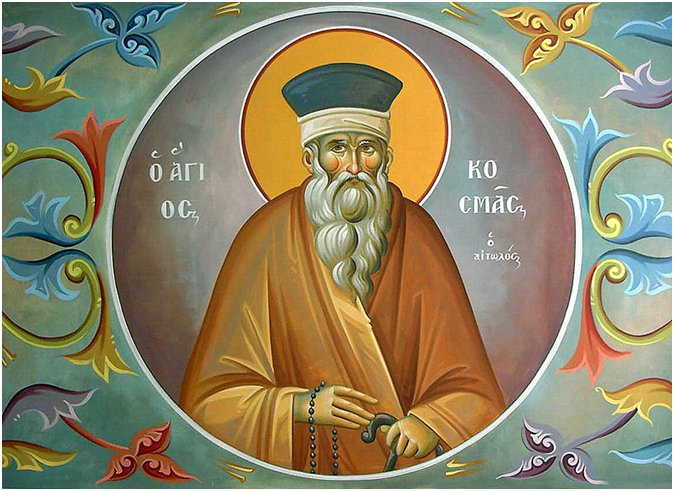 غير أنّ ردود الفعل التي أثارها تأسيس هذه المؤسّسة التي أخذت تبثّ روح الأنوار (القرن الثامن عشر) في قلب قلعة الأرثوذكسية، أجبرت بولغاريس وسواه من المعلِّمين الشهيرين على مغادرة آثوس، فانحطّت، سريعاً، حال الأكاديمية (1759). هذا كان للفتى قوزما إشارة إلى التدبير الإلهي، فقد تخلّى عن فكرة الدراسة وانخرط في الحياة الرهبانية في دير فيلوثيو حيث أهّلته غيرته وجهاداته النسكيّة وتقواه للسيامة الكهنوتية، بعد قليل من اقتباله النذور الرهبانية. منذ فتوّته كانت للمغبوط رغبة جامحة في نشر كلمة الله حوله لدرجة قال معها إنّ هاجس خلاص إخوته كان يتآكله كما تفعل الدودة بالشجرة من الداخل. في تلك الأوقات العصيبة من تاريخ الشعب اليوناني المقهور، كان جهل أساسيات الإيمان والثقافة المسيحيّة يؤدّي إلى إهمال الأخلاق وانحطاطها بحيث كانت الكرازة بالإنجيل تفرض نفسها كحاجة ولا ألحّ. لكنّه وَفق ما بثّه في نفسه تعليمُ الآباء القدّيسين، لم يشأ قوزما أن يخوض في الحياة الرسولية من ذاته. رغب في أن يعرف ما إذا كانت هذه مشيئة الله ففتح، يوماً، الكتاب المقدّس عفواً ووقع على هذا القول للرسول المصطفى بولس: “لا يطلبن أحد ما لنفسه بل كل واحد ما هو للآخر” (1 كو 10: 24). على هذا استنار بكلمة الله. وبعدما استمزج آراء الآباء الروحيّين في الجبل المقدّس، توجّه إلى القسطنطينية طلباً للإذن والبركة من البطريرك سيرافيم الثاني (1757 – 1761 م). كما رغب في أن يتابع هناك بعض دروس الخطابة لدى أخيه، الأرشمندريت خريسنثوس، الذي أضحى، فيما بعد، مدير الأكاديمية البطريركية ثمّ مدرسة ناكسوس. باشر الرسول الجديد عمله البشاري في كنائس نواحي القسطنطينية، ثمّ توغّل في المناطق الغربية من اليونان وعاد إلى القسطنطينية. إثر ذلك اعتزل لبعض الوقت في آثوس ثمّ أعطاه البطريرك صفرونيوس الثاني (1774 – 1780) البركة ليبشّر في أرخبيل السيكلاديس تعزية للسكّان المُحبطين إثر إخفاق محاولة التمرّد التي أثارتها روسيا سنة 1775 م. من هناك عاد ليختلي في الأديرة مُكمِلاً من الإقامة في الجبل المقدّس سبعة عشر عاماً. لكن محبّة إخوته دفعته، مرّة أخرى، إلى المغادرة، هذه المرّة إلى تسالونيكي حيث أقام لبعض الوقت في بيريا ثمّ جال في كل المقدونية يجمع حشوداً من المؤمنين الذين أصغوا إليه بنخس قلب. من كافالونية توجّه إلى جزيرة زاكنثوس ثمّ إلى كورفو ومن هناك عبر إلى الأبيروس حيث كانت المسيحية في حال من الشقاء. غرضه كان أن يثبِّت الإيمان الأرثوذكسي في الشعب ويحول دون اقتبال السكّان للإسلام. وإذ أعانت القدّيس قوزما نعمة الله، صنع في تلك النواحي عجائب حيث لا زالت أصداء أعماله البشارية تتردّد إلى اليوم. وقد تمكّن، إلى حدّ بعيد، بمواعظه، من تقويم أخلاق المسيحيّين. كلامه كان بسيطاً، في متناول الجميع، يستعين بالصور والتعابير المستعارة من الحياة اليومية. لكنْ، كان كلامُه، أيضاً، مشبعاً بالوداعة والسلام والفرح الذي وحده الروح القدس يُسبغه. كانت أقواله تتغلغل في نفوس سامعيه فيقتبلونها، للحال، بغيرة بمثابة تعبير عن مشيئة الله. وإذ لم تكن هناك كنائس تسع الجموع فإنّهم كانوا يجتمعون إليه في الهواء الطلق، على منبر متنقّل، بقرب صليب كبير غرزه في الأرض، ثمّ صار، بعد رحيله، نبعاً للأشفية وتخفيفاً عن الآلام الجسديّة والروحيّة. كان يعلّم المسيحيّين أن يعيشوا وفق وصايا المسيح وأن يحفظوا الأحد، الذي هو يوم الربّ، طارحين جانباً مشاغلهم ليذهبوا إلى الكنيسة ويُصغوا إلى كلمة الله. حيثما عبر كان يؤسّس المدارس. هذه كانت مهمّة أساسية في اعتباره. في هذه المدارس كانوا يتعلّمون، مجاناً، اللغة اليونانية والكتب المقدّسة. أقنع الأغنياء بأن يخصّصوا الفائض لديهم للإحسان وتوزيع كتب التقوى والصلبان والمسابح وحثّهم، أيضاً، على أن يقدّموا للكنائس أجراناً للمعمودية لتعميد الأولاد. كان هناك جمع يعدّ ألفين إلى ثلاثة آلاف يتبعونه حيثما ذهب بحيث شكّلوا جيشاً حقيقياً للمسيح في ألبانيا. كانوا ينظرون إليه باعتباره أخنوخ أو النبيّ إيليا أتى ليبشّر بفجر زمن جديد. قبل أن يباشر كرازته كان يقيم خدمة صلاة الغروب أو البراكليسي لوالدة الإله. ثمّ، بعد أن يتكلّم، كان يترك لما يقرب من الخمسين كاهناً، رافقوه، أن يتابعوا عمله في قبول اعترافات المؤمنين وإقامة صلاة الزيت ومناولة الشعب وزيارة كل مؤمن شخصياً. ومع أنّ تعليم القدّيس لم تكن له نكهة جدليّة بل انحصر في تعليم الفضائل الإنجيلية، ورغم أنّه لما مثَل أمام الباشا في يوانينا عامله هذا الأخير بالكثير من الإكرام، فإنّ بعض اليهود أغاظهم أن يُنقَل السوق من الأحد إلى السبت. وقد سعى هؤلاء لدى الباشا إلى التخلّص من قوزما. اعتاد قدّيس الله، كلّما بلغ موضعاً رغب في التبشير فيه، أن يذهب أولاً إلى أسقف المحلّة لأخذ بركته. ثمّ يرسل، بعد ذلك، بعض تلاميذه للحصول على تصريح من السلطة العثمانية المحلّية. بلغ، ذات يوم، قرية من قرى ألبانيا تدعى كوليكونتاسي، فعلم أنّ حاكم المنطقة، قورت باشا، يقيم غير بعيد من هناك، في بيراتي. ورغم النصائح التي وجّهها إليه المحيطون به، قرّر القدّيس أن يذهب بنفسه إلى المفوّضية المحلّية للحصول على تصريح السلطة المدنية فقيل له إنّ الأمر صدر بتحويله إلى كورت باشا. فهم قوزما أنّ الوقت حان له أن يتوِّج عمله بالشهادة، فشكر الله الذي أهّله لمثل هذا الشرف. في اليوم التالي، 24 آب سنة 1779 م، رافقه سبعة جنود بحجّة أنّهم يريدون أخذه إلى الباشا. ولكن، بعد ساعتين من السير في الطريق توقّفوا بقرب نهر باسو وأخبروه أنّه حُكم عليه بالموت. امتلأ فرحاً وشكر الله ثمّ بارك بعلامة الصليب أربع جهات الأرض ورفع صلاة من أجل خلاص كل المسيحيّين. ولما أتمّ ما رغب فيه رفض أن يقيِّدوا يديه لكي يحفظهما في شكل صليب. ولما شنقوه لم يبدِ أي مقاومة. هكذا أسلم الروح بتمجيد. كان قد بلغ الخامسة والستّين. ألقى جلاّدوه جسده في النهر. بعد ثلاثة أيّام اكتشفه كاهن اسمه مرقص، إثر صلاة، وكان كأنّه واقف حيّ. أخرجوه من الماء وبعد أن ألبسوه ثيابه الرهبانية واروه الثرى بإكرام. وقد جرت عند ضريحه وبرفاته، بعد ذلك، عجائب عدّة. سنة 1813 عمد علي باشا، الذي على يوانينا، والذي كان قوزما قد تنبّأ له بمستقبل مجيد، إلى بناء كنيسة ودير بقرب الضريح وقدّم جمجمته، في علبة من فضّة، إلى زوجته المسيحيّة فاسيليكي. اعتُبر قوزما الشهيد أميراً للشهداء ورسولاً جديداً. هكذا أكرمه الشعب من وقت استشهاده. لكنْ لم يكتب اسمه في السنكسار رسمياً إلاّ في العام 1961، من بطريركية القسطنطينية |
||||
|
|
|||||
|
|
رقم المشاركة : ( 14202 ) | ||||
|
† Admin Woman †
|
الإعتراف
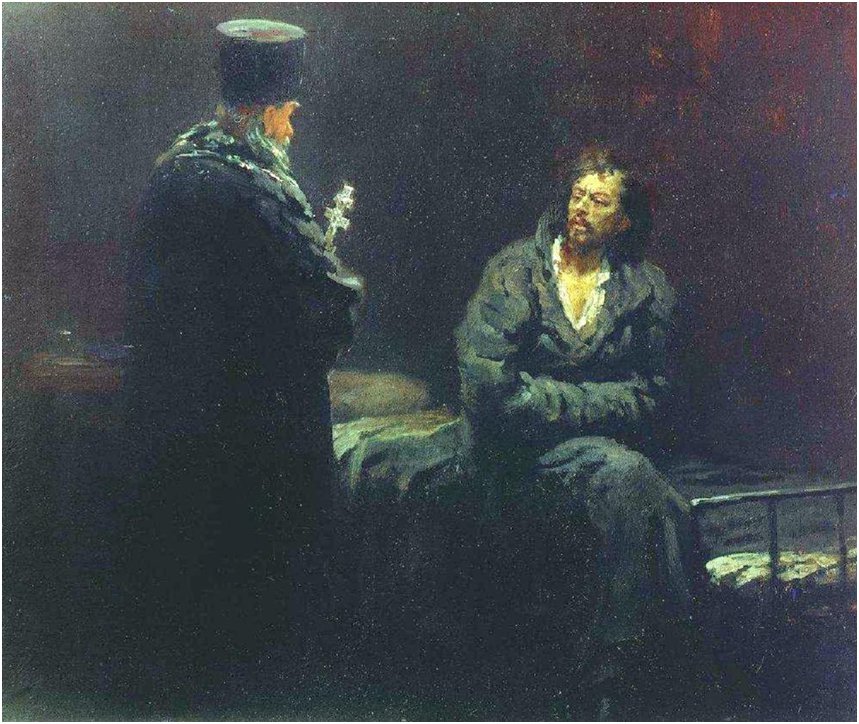 “من يعترف بخطيئته هو أهمّ ممّن يقيم الموتى” قول مأثور للقدّيس إسحق السريانيّ القرن السادس، ويُضيف “هو كمن ينتقل من الموت إلى الحياة”. هذا الإعتراف يتمّ عند الإنسان أوّلاً بينه وبين الله ولكن، أيضًا وخصوصاً، أمام الكاهن وأمام الذي أخطأنا إليه: “رجع إلى نفسه” يقول الإبن الشاطر، “أقوم وأذهب إلى أبي وأقول له يا أبي أخطات إلى السماء وقدّامك” (لوقا 15: 17-18). هذا التحوّل، هذه التوبة métanoie تتمّ، كما ذكرنا، أوّلاً في القلب، في النفس وتستوجب بعدها إقراراً بالخطيئة تعبيراً علنيّاً لها عن طريق الإعتراف في الكنيسة. العمليّة هذه تُدعى سرّاً Mystère أصل الكلمة: عملٌ خفيّ حاصل بإرادة الإنسان وبنعمة الله: مشاركة بين الإنسان والله معروفة في العقيدة الأرثوذكسيّة بكلمة synergie أي مشاركة بالعمل. القدّيس يوحنّا الدمشقيّ، في كتابه الشهير “الإيمان الأرثوذكسيّ” يحدّد التوبة بأنّها تحوّل النفس من الشيطان إلى الله، ويقول إنّ هذا لا يتمّ إلاّ بالألم والدموع. هناك، إذاً، انسحاق لدى الإنسان وتواضع كبير “الذبيحة لله روح منسحق، القلب الخاشع المتواضع لا يرذله الله” (المزمور الخمسون). * * * جرت العادة قديماً أن يتناول البعض القرابين المقدّسة يوم الخميس العظيم خارج القدّاس الإلهيّ على يد الكاهن وبعد اعتراف سريع. إليكم هذه القصّة المعبرّة عن الإنسحاق والتواضع في الإعتراف: أتى مرّة، في ذلك اليوم، رجلٌ وجيه معروف في القرية، جاء إلى كاهن أمّيّ لكنّه تقيّ جدّاً. طلب منه مناولة القرابين لأنّه كان مشغولاً بعد أن يحلّه من خطاياه. فرجاه الكاهن البسيط أن يسجد على الأرض ويقول “اغفر لي يا الله أنا عبدك الخاطئ”. فامتعض الرجل وأبى أن يسجد زاعماً أنّه لم يَنثَنِ ولم يركع لأحد طيلة حياته الماضية وقال: “من الذي يطالب بذلك يا أبي”؟! فأردف الكاهن البسيط مستغرباً جدّاً وأتى بكتاب الكاهن وأراه الجملة القائلة: “ويسجد المعترف ويصلّي ليأخذ الحلّ من خطاياه من الكاهن”. عندها تنازل الرجل وسجد قائلاً أمري لله! أخذ الحلّ من الكاهن وتناول. بعدها وقف أخيراً وقال أشكر الله وأشكرك يا أبي لأنّي تواضعت وأخذت الحلّ من خطاياي وتناولت القرابين المقدّسة. * * * أخيراً وليس آخراً، يشير الآباء الروحيّون إلى أنّه من أهمّ الأشياء التي ينبغي أن تتمّ على فراش الموت وقبل الخروج من هذه الدنيا طالما نحن واعون، الإعتراف قبل الموت، وأن يندم الإنسان على كلّ خطيئة اقترفها في حياته. هذا الأمر لا بدّ من أن يتذكّره الكاهن الذي يرافق المريض في أواخر حياته وقبل أن يسدي له القرابين المقدّسة. هذا ممّا يساعده على إنهاء حياته بسلام وتوبة. أفرام، مطران طرابلس والكورة وتوابعهما |
||||
|
|
رقم المشاركة : ( 14203 ) | ||||
|
† Admin Woman †
|
أسئلة وأفكار…
 كان القدّيس الجديد باييسيوس الآثوسي ينصح الذين يسألونه عن المسيح الدجّال، بالتفكير بالمسيح والعيش معه، بدلاً من تضييع الوقت، واستجلاب المخاوف، وهدر الطاقات، بالتفكير بالمسيح الدجّال ووقت مجيئه. هكذا يعلّم المستنيرون. وحدهم يضعون النقاط على الحروف.فالتعليم والتربية الدينيَين لا ينفصلان عن بعضهما. أنت تتعلّم لكي تعيش بموجب التعليم الذي تؤمن به، لا لكي تزيد معلوماتك. ليس الإيمان تجميعاً معلوماتيّاً عن الله وما يختصّ به، وإنّما معرفة تنعكس في طريقة عيشك وسلوكك وأخلاقك. من هنا كان للأبرار الدور الأهم في التربية الدينية، التي لها،ككل تربية، شؤونها وشجونها. وكثيراً ما وُضعت في خدمة الحرفيّةفشوّهت الإيمان ومسخته.فعلى سبيل المثال، أن تؤمن بأنّ الله عادل وديّان شيء، وأن تجعل دينونته الوجه الذي يحجب محبّته شيء آخر بالكليّة. فالله ليس كغيره من الكائنات. إنه ّسرّ بالنسبة للبشر، كونهم لا يستطيعون استيعابه بالكليّة، بعقولهم المحدودة بالزمان والمكان والفناء. هم يتلّمسون حضوره، ويتلّقون كشفه لهم في ملاطفات إلهية يحرك فيها النفس التي تتوق إليه. ليست العقيدة المسيحية تراكم تحليل فلسفي بشري، بل صياغة بشرية للكشف الإلهي، في ما ندعوه عمل الله أو تدبيره الخلاصي، الذي بلغ ملأه في يسوع المسيح. ومن بعد صعود المسيح إلى السموات، يكشف الروح القدس للكنيسة، عبر المستنيرين به، وجه استقامتها،كما يحفظها من الانحراف. وُضعت العقيدة المسيحية في قوانين إيمان، صيغت، عبر التاريخ،حفظاً للإيمان المستقيم، وصوناً للحياة المسيحيّة الحقّة، وذلك بسبب شيوع الهرطقات. وقد بدأ التعليم المسيحي مع الرسل الاثني عشر، وكان في البدء، كما يظهر من عظات الرسولين بولس وبطرس، في سفر أعمال الرسل، متركزاً على موت المسيح وقيامته من أجل خلاصنا. أمّا ممارسة التعليم الديني،فما كانت معصومة من الوقوع في الأخطاء. والمطبّ الأخطر، في هذا المجال، هو الانحطاط الذي أصابه عبر التاريخ، لأسباب شتّى، لامجال لذكرها في هذه العجالة فبالقدر الذي يبتعد فيه التديّن عن جوهر الدين، يصبح الدين مجرّد ممارسات تقليديّة أو اجتماعيّة أو ثقافيّة، ويتعرّضللتشويه، ويلعب دوراًفي تكوين عقليّة تنادي به وتحارب جوهره، في الوقت ذاته. لكن كيف يتبنّى المؤمن إيماناً روحيّاً سامياً، بينما عقليّته متأثرة بمفاهيم وقِيَم تتناقض وإيمانه؟ ثمّة أسئلة جوهريّة في قضايا الدين والعقل والمجتمع. فإلى أي مدى يتأثّر تجسيد القِيَم الدينيّة في الحياة، بالعقليّة المحليّة، والعادات الاجتماعيّة، والثقافة السائدة؟ ألا يفهم الإنسان الإيمان انطلاقاً من عقليّته ونمط تفكيره، إذ إنّه، كثيراً ما يخلط بين قناعته الدينيّة وقناعته الاجتماعيّة ولا يميّز بينهما؟ وكيف يُقَوِّم التربية المغلوطة التي نشأ عليها؟ كيف يساهم الدين في تكوين عقل وفكر منفتحَيَن وغير خائفيَن، إذا كان المجتمع يربَّيه على الخوف؟ تجد في كلّ الأديان تيّارات محافِظة وليبرالية ومعتدلة وإلى ما هنالك. لماذا؟ أليس لأنّ فهم الإنسان للدين، وكيفيّة عيشه، تختلف من إنسان لآخر؟ هل نظرة المؤمن، الذي نشأ في مجتمع يساوي بين المرأة والرجل، مماثلة للذي نشأ في مجتمع قامع للمرأة، ولا يتعاطى معها ككائن بشري مستقلّ وحرّ؟ أتراه حسّ الخطيئة بالكذب، هو ذاته عند المؤمن الذي يحيا في مجتمع يعتبر الكذب الرذيلة الكبرى، وذاك الذي يعتبر مجتمعه أنّ “الكذب ملح الرجال”؟ من هذه الزاوية، يتوجّب على المؤسّسة الدينيّة أن تولي قضية التربية الأهميّة التي تستحقها.ففي الدين، كما في غيره، طرائق تربويّة تساعد الإنسان في سعيه إلى الحياة الحقّة، التي يدعوه الله إليها. ولكن التاريخ يُظهر أنّه كثيراً ما شاب التربية الدينيّة عناصر ثقافيّة ارتكزت على الدين لتؤكّد نفسها. فطرائق التربية، التي تختلف من عصر إلى آخر، تبقى مجرّد قنوات لإيصال التعليم، وليست غايات. فقد كانت التربية قديماً قائمة على العقاب أكثر من التحفيز، وعلى الاستبداد أكثر من الحريّة، وعلى التحكّم بالآخر ورسم طريقة حياته، بدلاً من إفساح المجال له، لكي يختار ما ينفعه ويفيده. وتأثرت الممارسة الدينية بهذه العقليّة وأثرّت فيها أيضاً. وصار الله مصدراً للعقاب، وتربّى كثيرون على أخلاقيّات إرضاء الغضب الإلهي، وعدم معصيته، اتقاءً لناره الأبديّة، فكفر كثيرون وهجروا الدين، وصورة الله المشوّهة معه. كثيراً ما كانت التربية قائمة على تخويف البشر من الله،لكي يبعدوهم عن الموبقات، أكثر من تنمية حبّ الله فيهم، لئلا يجرحوا محبّته بارتكابها. فصار الله فزّاعة في أيدي المؤسّسات، بما فيها الدينيّة. وبقي أداة لتربية الناس وفق مصالح وأهداف لا تمتّ بصلة إلى وجه الله الحقيقي، ولا تهتمّبخلاص الإنسان، وبناء حياته الفضلى، كما أراه الله إياها. يبدأ نمو الحسّ بالخطيئة وبشاعتها، بالتعرّف إلى حياة اللاخطيئة. والفرق هائل بين امتناعك عن القيام بعمل ما، فقط، لأنّ الدين ينهى عنه، وبين عدم اكتراثك به، لأنّك تتطلّع وتتشوّق إلى ما هو، بنظرك، أفضل منه بما لا يقاس. قامت الشريعة في العهد القديم على النهي، أمّا المسيح، فقد أتى بشريعة الحبّ، التي تقوم على تخطّي رذيلة ما،في سبيل طلب ما هو أسمى منها. لكن، للأسف،ومن يبقَ في الأولىيكن إنسانه القديم أقوى من الجديد، لأن محبّة الله لم تمتلكه بعد. كثيراً ما وقفت الهيئات الدينيّة،كما المؤمنين أفراداً، عند حرفيّة النصوص الدينيّة، مستسهلين عدم الغوص فيها، استجلاءً لجوهرها، ولغايات خاصّة، ليس الله محورها بالتأكيد، ممّا أدّى إلى تشويه المفاهيم والقيم الأساسيّة، واستبدالها بأخرى مغلوطة، وأحياناً مضادّة للجوهر. الأمر يحتاج إلى إرشاد وتوجيه ممن قد انسكب فيهم نور الله، فعرفوه معرفة شخصيّة كيانيّة. تقود عِشرة القدّيسين إلى امتلاك الرؤية المستقيمة، والدخول في الخبرة المعرفيّة الحقّة. اختلفت التربية اليوم، كما اختلفت عقليّة الإنسان، عمّا كان في الماضي. فالإنسان الذي ينشأ اليوم على التفكير العلمي، واستخدام المنطق والمحاجّة والمقايسة، بات إنساناً حضارياً، عليك أن تقدّم البشارة له، بأسلوب مختلف عمّا كانت عليه في الماضي، وأكثر توافقاً مع روح المسيحيّة وجوهرها. فهل نكون على قَدْر المسؤولية المطلوبة؟ المطران سابا (إسبر) |
||||
|
|
رقم المشاركة : ( 14204 ) | ||||
|
† Admin Woman †
|
Contemplating the Virtue of the Theotokos
« 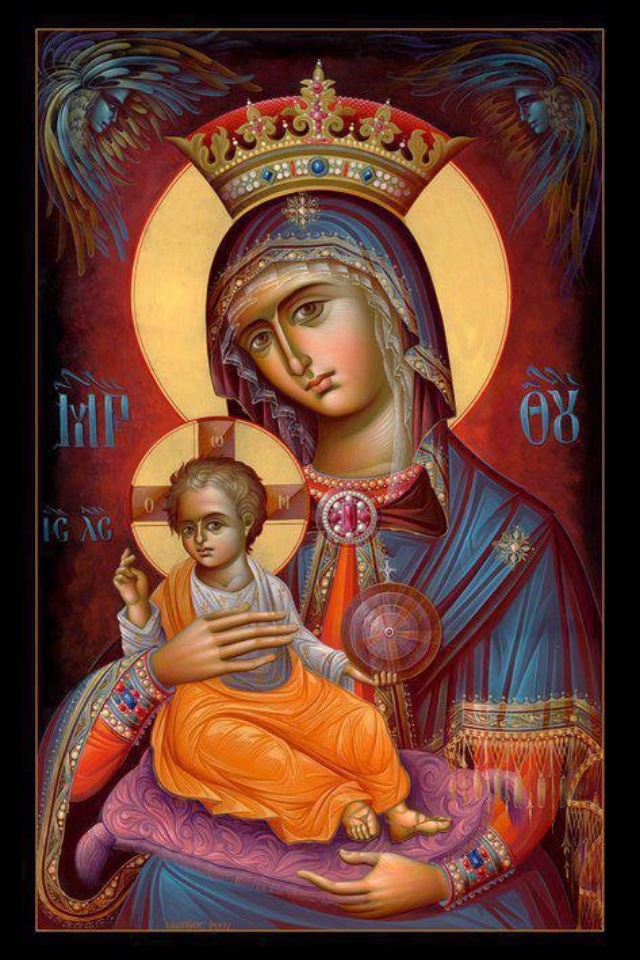 During the winter months the sun had already set by the time I reached the Holy Dormition Monastery of the Mother of God. Vespers was most often held in the large catholicon outside the monastery gates. Entering the outer narthex I would light a beeswax candle in front of the festal icon the sisters had laid out on an icon stand. As soon as I opened the large wooden door to the nave I would be greeted by the sound of the nuns melodic chanting and surrounded by the sweet fragrance of burning incense. I would then proceed to the large icon of the Mother of God, depicted with the Lord on her lap. In those sacred, if fleeting, moments a person could feel genuinely connected to the Mother of God. In the dim light of the church, one could even supplicate the Theotokos with tears and be noticed by no one. As far away as she seemed out in the world at times, that much and more close she seemed in the sacred space of her holy monastery. To stand in the presence of a holy icon is to stand in the presence of the person depicted therein, and so whether we stand before a large icon encased in an elaborately decorated wooden icon stand or before a paper icon taped on the wall of our bedroom, we stand before the holy person whose countenance is painted in line and colour. But in the peaceful, prayerful atmosphere of a holy monastery, we often become more attuned to the spiritual reality surrounding us, and being more attuned to this spiritual reality not only makes our prayer flow more readily but contemplation of holy mysteries comes within our grasp. It is in moments such as these that I contemplate the person of the Most Holy Theotokos. Thinking on her life and works, her sufferings and sacrifice, I feel as though she offers us the answer to all our problems. The example of her life is the cure to our illness, the source of joy to heal our sorrow. By means of merely two of her countless virtues – obedience and purity – she teaches us everything. In her obedience to God she shows us that perfect freedom and attaining our “full potential” is found in submitting our fallen and corrupted will to the all-good Father, thus molding our will into His will and therefore being able to (eventually) not only “know the good”, but will it and do it. With her outward and inward purity she points us to the easy path of sanctification. By keeping our souls and bodies pure, by not even accepting corrupted thoughts, we maintain the ability to hear and communicate with God, and thus know how to live in conformity with His will. If we have long ago lost our purity – whether it be mental, spiritual and/or physical purity – we have the opportunity to restore it through confession and repentance. Confession and repentance are our constant means to imitate her virtue and please her Son and our God, as she does best of all. And so, no matter how ill we are, no matter our upbringing, no matter the genetic weaknesses we have inherited (of body and soul), no matter the state of the world around us, we have the opportunity by God’s grace, through the prayers of the Theotokos, to become healthy, to become holy. We too can, in our own dormition, pass from life to life through a mere “falling asleep”, if only we would imitate her virtue. |
||||
|
|
رقم المشاركة : ( 14205 ) | ||||
|
† Admin Woman †
|
9th Sunday of Matthew (Jesus walks on the waters)
The disciples were ordinary men. But despite being close to Christ -seeing him, seeing the miracles he performed, and hearing his words- it was as though they were living in another world, as though they understood nothing. Normally, they should not have feared when they saw the Lord walk on the waters nor should Peter have begun to sink. Yet, Peter, is still driven by his own self and he would suffer many other things until the Holy Spirit came to him on the day of Pentecost, and baptized them all in the Holy Spirit and fire. And Christ questions him: “Why did you doubt?” And yet, Christ does not reject him in this instance, nor in others. He does not reject him, nor does he banish him. Although the disciples were with Christ and listened as he spoke to them, they were influenced only up to a certain point, as they had human weakness. Peter, that old salt, so to speak, was afraid of the wind and began to yell: “Save me, Lord”. All of this occurred before Pentecost. And yet, the disciples were not like this after Pentecost. They were changed, having the Spirit of God within them. And because of this, they became wonderworkers. Because of this they feared nothing. And in the end, almost all were martyred. On the one hand, the Lord tolerates and shows condescension to our human weakness. And yet on the other hand, we have no excuse for not living a Christian life. We, who are baptized Orthodox Christians, have received in baptism the Holy Spirit -that which the disciples received on the day of Pentecost. And we also partake of the Body and the Blood of Christ when we commune. And despite all this, we for the most part resemble the unbaptized. We must be greatly preoccupied with this subject. |
||||
|
|
رقم المشاركة : ( 14206 ) | ||||
|
† Admin Woman †
|
Saint Kosmas the Aetolian as a Missionary Part 2
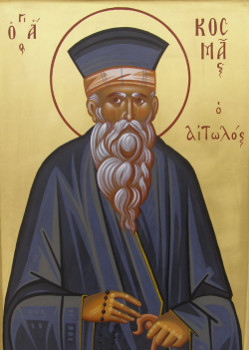 What did this man not do for the benefit of the Greek nation! First, the young Christian women serving as wet-nurses to the tyrants’ children in the palaces of the Beys and Paschas were in constant danger of being lured away from the faith through various temptations, or of being lead into debauchery, and therefore of being lost completely. Saint Kosmas succeeded in convincing many Turks to release such women from their service by telling them that they would insight the wrath of Uranus on account of their debauchery and their mingling with women of foreign religions, and that their race would thus be wiped off the face of the earth. “Where,” he asked, “has your former glory gone? Are you not the ones who under Sulayman conquered lands as far away as Vienna? Your debauchery had humbled and destroyed you. Repent, cast out the Christian women you have in your palace.” On the other hand, he advised Christian women not to become wet-nurses to Turkish children lest they suffer the same fate as the hen who hatched the viper’s eggs in the Aesopian fable. According to Vasileios Zotos, author of The Dictionary of all the Saints of the Orthodox Church, some 1500 Christian wet-nurses who had been serving in the palaces of the Paschas and the Beys were set free as a result of the Saint’s activities. Second, the villages of Epirius, Macedonia and Albania did not, for the most part, have baptismal fonts, and thus their infants were not receiving proper baptism. Saint Kosmas was shocked by this sin, i.e., that Orthodox children were not being baptized canonically and thus convinced the wealthy Greeks of Constantinople, Ioannina, and other Hellenic cities to donate money in order to have baptismal fonts crafted. As a result, 4000 copper-plated baptismal fonts were made and sent to all the village churches which did not have them. Third, a great number of starving, half-dressed orphans, whose heroic fathers had been killed by the Turks, were found wandering the streets during this period. What could be done for these forgotten victims of the nation’s tragedy? Here again the love of a caring father worked wonders. In his teachings he strongly encouraged all Christians, particularly those couples which had no children, to take into their families one or two orphans. He encouraged them to do so irregardless of their financial status and as a result the rich blessing of God was visited upon their homes. Oh, how many orphans and poor children were saved as a result of the fatherly interest shown by this missionary preacher! Fourth, from his touring the Greek countryside Saint Kosmas concluded with deep sorrow that there were virtually no schools to be found that Greeks might attend. Nearly all of the Christians, both men and women, were illiterate; one could, in fact, count on the fingers of a single hand the number of people in each village who were able to read and write. He spoke to the people with fervour concerning the great worth of education, of the necessity of Christian education, and of the how the next generation ought to be brought up, things which would later lead to the miracle of the revolution in 1821. “Open schools!” he cried everywhere, “Study, learn letters to the extent that you are able, my brothers. If you are unable to learn, fathers, have your children study and learn Greek instead since everything in our Church is in the Greek language. If you do not learn Greek, my brothers, then you will not understand that which our Church confesses. Better it is for you to have a Greek school in your village than for you to have springs and rivers, for when your child learns letters then he can truly to be called a man. The school opens churches; the school opens monasteries.” As a result of the Saint’s activities, some 210 Greek schools were erected, and 1100 other smaller schools began to function at which Greek children were taught to read and write. A light – the light of Christian education, lit by the Saint himself – was cast upon a people who sat in darkness of ignorance. One lone man stood in for the Ministry of Education which remained inoperative during Turkokratia. Where did the Saint find the sum of money needed to fund the construction and day-to-day operation of these schools, one might ask? He had no money of his own; like Christ he was poor and had nothing of his own. “I, my brothers,” he said, “by the grace of our Lord and God Jesus Christ, the Crucified One, I have neither purse, nor house, nor chest, nor another cassock than the one I am wearing. And I still beseech my Lord to never allow me to acquire until the end of my life a purse, for if I ever begin to take money, I have immediately lost my brethren. I cannot serve both; it is either God or the devil.” And yet this monk who possessed nothing of his own managed to collect such huge amounts of money for his work. How did he do this? Listen and I will tell you! During his travels, this missionary preacher, he noticed that women, no matter what their financial status, loved luxury, dressing in silken clothing, wearing rings, bracelets, earrings, chains, and ribbons of gold in their hair. Great wealth rested on the fingers, chests and heads of wealthy women; they were adorned with vanity! Saint Kosmas put a stop to this adornment. Through his teaching against such luxury, he persuaded Christian women to give up all this useless treasure, this gold, this silver, there precious stones for the good of the nation, for the establishment and operation of schools and, what wonder, they gave it all up! These treasures which he collected, then, represented the very beginning of a special fund, a fund from which alms might be given. The aforementioned author (V. Zotos) lifts up his voice to the most-high God in praise of these women who, at the moment they heard the Saint preach hastened to offer their expensive adornments, in praise of these admirable women as well as the Saint’s other co-labourers, offering the following moving words: “Merchants, builders, iconographers, teachers, priests, monastics and those living in the world followed the Saint’s teachings, facilitating the work of establishing schools and churches. We sing, ‘Memory Eternal’ to those women of Epirius who built 210 schools from the money attained from their jewellery and who endowed them with the extra which they had. A thousand times ‘Memory Eternal’!” Fifth, by means of his fiery preaching the Saint managed to end the practice of opening the markets on Sunday, seeing that these were moved to Saturday (a fact which caused the Jews great sorrow, and lead them to bear a hatred-unto-death for him). He taught the importance of Sunday like no other, heaping burning coals on those who profaned it. He wanted Christians to love labour, to be ever cultivating the earth, and particularly to be planting trees. “Those who do not love trees and plants will live in poverty.” On account of the emphatic recommendation of the Saint, thousands of wild trees were grown and eventually bore fruit. 5. Prophesies and miracles. 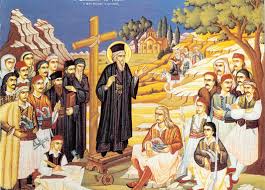 Saint Kosmas’ great influence cannot be entirely explained without taking into account another important element which contributed significantly to the tremendous progress he made in his missionary work. This element is exactly that which is noted at the end of Saint Mark’s gospel: “And they [the Apostles] went forth and preached everywhere, the Lord working with them, and confirming the word with signs following. Amen” And signs followed the Saint’s teaching for he has not only the gift of speech, but also the gift of working miracles and prophesying concerning the future. Saint Kosmas’ great influence cannot be entirely explained without taking into account another important element which contributed significantly to the tremendous progress he made in his missionary work. This element is exactly that which is noted at the end of Saint Mark’s gospel: “And they [the Apostles] went forth and preached everywhere, the Lord working with them, and confirming the word with signs following. Amen” And signs followed the Saint’s teaching for he has not only the gift of speech, but also the gift of working miracles and prophesying concerning the future.6. Conclusion. Beloved! What a missionary – a missionary “equal to the Apostles” as the hymnographer who wrote his service writes – Saint Kosmas was shown to be. Honouring his holy memory, let us give thanks to the Lord for this new luminary of the Orthodox Church, and let us also ascribe honour to those people who cooperated in Divine Providence, in the development of this great missionary figure of the later times. Let us first ascribe honour to his devout parents, who from his infancy nourished him with the pure milk of Orthodoxy, then to his teachers, to the wise Evgenios of Bulgaria, to his spiritual fathers and brethren on Mount Athos amongst whom he trained to become a true struggler for the faith. Finally, let us ascribe honour to the Patriarchs Seraphim and Sophronios of blessed memory, who encouraged him in his missionary work and furnished him with letters commending him to all the bishops of the Ecumenical Patriarchate. This last aid was inestimable since without the permission and commendation of the Patriarchate, Kosmas would not have been able to circulate freely in Turkish-occupied Greece. This immediately brings the thought to mind: if Kosmas lived in our day, would he have received such support from the hierarchy of the contemporary Church? It is our fear that this apostolic man, who did not sugar-coat the weaknesses of those in ecclesiastical authority, but rather checked vice wherever he saw it (even if it was in Episcopal or Patriarchal courts), would not have been granted permission to preach. He would have been sentenced to return to the monastery of his repentance as a troublemaker and a threat. Any who would cast a glance at the life of the contemporary Church would sigh bitterly at the lack of missionary figures like Saint Kosmas the Aetolian. If he tries to find the reason for this lack, he will find a multitude of causes; one of these, in my own view, is that the missionary inclinations of pure servants of the Gospel do not only receive no support in our day, but are condemned. They are condemned first and foremost by those who ought to be supporting them. This is a sorrowful observation. |
||||
|
|
رقم المشاركة : ( 14207 ) | ||||
|
† Admin Woman †
|
Holy sayings
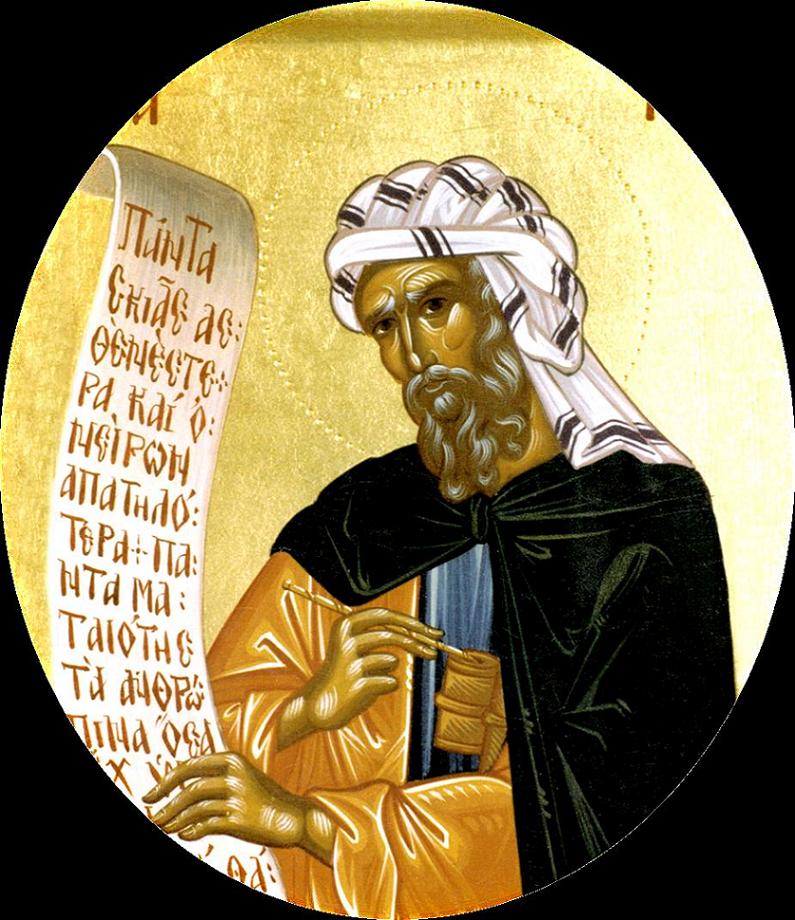 Someone else waters Here in this world the farmer cultivates the earth, but also needs the rains and the waters that come from the sky! St Macarius of Egypt Let us destroy them We should not maintain the thoughts that are pleasing to the devil, but we should destroy them using the knife of the Godly word. St John of Damascus Whoever gets glory in this world, is lost with this world Whoever gets glory in this world, is lost with this world. However, the ones who are glorified with Christ are saved by Christ. The glory of this world is death, while the glory of Christ is life, life eternal and immortal. St Nikolaj Velimirović |
||||
|
|
رقم المشاركة : ( 14208 ) | ||||
|
† Admin Woman †
|
The 10th Sunday of Matthew (the father with the epileptic child)
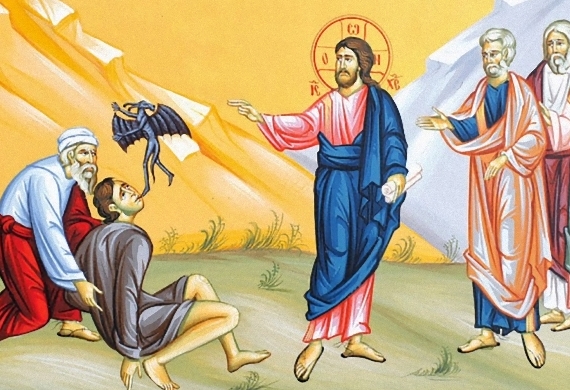 The crucial point for all of us here is faith The pained father says to Christ that he brought his child to his disciples, but that they were unable to heal him. He then begged Christ to do something. And Christ says to him: “If you can believe, all things are possible to him who believes”. And this applies to all circumstances. The crucial point for all of us here is faith. The father of the epileptic child received that which he wanted. And this, he was given by Christ because he spoke so truthfully: ”I believe, Lord, help my unbelief”. It was as though he said: “If you ask me, my God, my whole soul is one giant unbelief, but whatever depends upon my logic, whatever on my intention, I believe, Lord, help my unbelief”. And this was the right response. Either you want it or not, this is what you are. Recognize this, and confess it. When you, as a free human being, think logically you are able to express what is right, to speak the truth, and God hears it. Hence you will receive that which you desire. When this involves bodily sickness, the Lord will heal it. When, however, it is about our souls being healed, we will experience a great deal of pain. And this, not because God tyrannizes or wants to torture us, but because man is distorted. For this reason, that which is first needed is for man to feel, to accept, that he is distorted and to confess it: “I believe, Lord, help my unbelief. Help the perversion that exists in me, and bring out the good that only you can bring out”. When we approach God in this way, little by little we uncover the true road, eventually saying: “But, what is this? What is happening? For so many years I’ve been a Christian, and yet I wasn’t a Christian at all. And it is only now that I am beginning to find God, only now that I begin to find God’s grace”. And you feel –even belated– that God accepts you and as you repent, that he gives you forgiveness, and gives you his grace. |
||||
|
|
رقم المشاركة : ( 14209 ) | ||||
|
† Admin Woman †
|
عروس المسيح
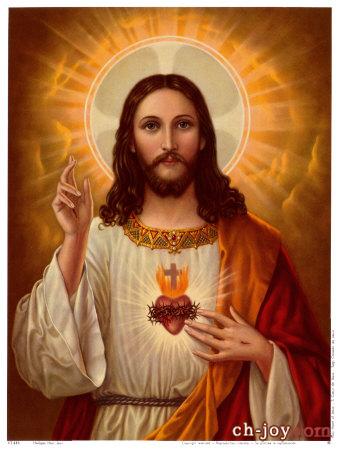 ” لِنَفرَحْ وَنَتَهَلَّلْ وَنُسَبِّحِ اللهَ لِأنَّ الوَقتَ قَدْ حانَ لِعُرسِ الحَمَلِ، وَالعَرُوسُ قَدْ أعَدَّتْ نَفسَها. ” رؤيا 7:19 لم أفكر قبلا ان الكنيسة عروس المسيح ، سمعت الكثير من العظات لكنى لم أقرأ قط فى هذا الموضوع ، لم أتوقف عن التفكير في هذا الامر . حضرت حنة زفاف لصديقة شابة . كانت صديقة جميلة ، أمضينا الكثير من الوقت معا ، و كانت ممتع جدا ان أشاركها هذا اليوم ، كانت العروس تحيك الخرز على ثوب زفافها – كانت مئات من الخرز . كانت تعمل بجد لتبدو جميلة امام عريسها . و بالطبع الظهور بشعر دهنى و بنطلون جينز ممزق . العرائس يشترين كل ما هو جديد و جميل ليظهرن فى افضل مظهر . عندما يأتي المسيح ، العريس ، ليلتقى بعروسه ( اى الناس المدعون على اسمه ) ، سنكون مستعدين للقاء العريس – فى بهاء و مجد . لكن النور الحقيقى يأتى من داخل قلوبنا ، مصدره نور يسوع المسيح فينا . اشار ديفيد هازرد في كتابه عن كتابات تريزا من افيلا ، ان القداسة مصدرها نور المسيح الذى يسطع داخل نفوسنا . ” النفس الثابتة في المسيح لا يمكن أن تفقد بهاء نور الملك. حينما يتربع البار على العرش ( عرش قلوبنا )، لا يمكن أن تفقد القلاع بهاء مجدها. لكننا بإهمالنا الاحمق و جميع ما أخطأنا به بإرادتنا ، نكسو القلعة بأكملها بكساء أسود ” . التركيز على افكار شريرة آتية من نافذة مفتوحة على العالم سواء في المنازل أو السيارات شوهت كل ما هو غالى و نفيس . هذا تماما ما تفعله الخطية في نفوسنا . و بالتالي تمنع استنارة واشراقة مجد المسيح فينا . ( مزمور 34: 5 ) ولكن يمكننا تغيير ذلك ، نستطيع ان نمتلئ بالنور الإلهي مرة أخرى . 1 يوحنا 1: 9 يقول : ” أمّا إنِ اعتَرَفنا بِخَطايانا، فَاللهُ أمِينٌ وَعادِلٌ ، يَغفِرُ لَنا خَطايانا، وَيُطَهِّرُنا مِنْ كُلِّ دَنَسٍ . ” لاحظ ” كل دنس” ؟ هل تحتاج إلى أن يطهرك الله من كل دنس؟ هل اهملت طهارة و نظافة نفسك ؟ لنكن العروس المشع ببهاء مجد الله. ” أبي السماوي، أعترف أمامك أني وجهت حياتي كما أشاء و أخطأت في حقك. أشكرك لمغفرتك لخطاياي بموت المسيح على الصليب. الآن أريد يسوع المسيح أن يملك على حياتي. إملأني بروحك القدوس. أشكرك لأنك الآن ملكت على حياتي و ملأتني بروحك القدوس كما وعدت أمين” هل هذه الصلاة تعبر عن رغبة قلبك؟ إن كان كذلك أدعوه الآن. وسيملأ الروح القدس حياتك. هل صليت هذه الصلاة طالبا من الله أن يملأك بروحه القدوس؟ إذا صليت بالإيمان أن تمتلئ بالروح القدس فكن متأكد وعلى ثقة بوعد الله بذلك، فحتى و لو كنت لا تشعر بأي شيء الآن، لأن الشعور بالامتلاء بالروح القدس يشبه تماما شعورك عندما قبلت الرب يسوع المسيح ربا ومخلصا لحياتك. لأنك لا تشعر بذلك في نفس اللحظة بل إنك تلاحظ تأثيره على حياتك وعلى أفكارك يوماً بعد يوم. |
||||
|
|
رقم المشاركة : ( 14210 ) | ||||
|
† Admin Woman †
|
مخافة الرب ومكافأتها
مَا أَعْظَمَ جُودَكَ الَّذِي ذَخَرْتَهُ لِخَائِفِيكَ، وَفَعَلْتَهُ لِلْمُتَّكِلِينَ عَلَيْكَ تُجَاهَ بَنِي الْبَشَرِ ! ( مزمور 31: 19 ) إن كانت كلمة الله تُحرِّضنا على مخافة الرب بالقول: «سيروا زمان غربتكم بخوفٍ» ( 1بط 1: 17 )، لكنها أيضًا تُعلِن لنا ما في قلب الله أبينا من جود ووعود لخائفيه؛ زمنيًا وأبديًا «التقوى نافعة لكلِّ شيءٍ، إذ لها موعد الحياة الحاضرة والعتيدة» ( 1تي 4: 8 ). وإن كنا نتفكَّر في هذه المكافأت، إلا أن مخافتنا للرب ليست لطمعٍ في أجرةٍ أو خوفِ من نارٍ، لكننا نحب الله أبانا ونوقِّره مُتممين هذا الأمر الإلهي «إن كنتم تدعون أبًا الذي يحكم بغير مُحاباة حسب عملِ كل واحدٍ، فسيروا زمان غربتكم بخوفٍ» ( 1بط 1: 17 ). وإليك بعض هذه المكافأت: (1) تسديد الاحتياجات: «اتقوا الرب يا قديسيه، لأنه ليسَ عوزٌ لمُتَّقيهِ» ( مز 34: 9 ). ولعلَّنا نذكر إكرام الرب لأرملة واحد من بني الأنبياء، صرخت إلى أليشع بسبب ديونها المادية قائلة له: «أنتَ تعلم أن عبدَكَ كان يخاف الرب» ( 2مل 4: 1 )، فتداخل الرب وأغدَق عليها، مُتممًا وعده «ليسَ عوزٌ لمُتَّقيهِ». (2) كشف الأسرار «سر الرب لخائفيهِ، وعهدُهُ لتعليمهم» ( مز 25: 14 ) أ لم يفعل الرب ذلك في زيارته لإبراهيم «فقال الرب: هل أُخفي عن إبراهيم ما أنا فاعلُهُ؟» ( تك 18: 17 ). (3) البركات الروحية: وبعد أن أظهر إبراهيم طاعة وخضوعًا للرب بتقديمه وحيده على المذبح، ناداه الرب قائلاً: «لأني الآن علمت أنَّكَ خائفٌ الله، فلم تُمسِك ابنك وحيدك عني»، ثم تأتي المكافأه له: «أُباركك مُباركةٌ، وأُكثِّر نسلك تكثيرًا … ويَرِث نسلُكَ باب أعدائهِ، ويتبارك في نسلك جميع أُمم الأرض» ( تك 22: 12 -18). (4) البركات الزمنية: ما أروع ما قيل عن القابلتين في خروج 1: «ولكن القابلتين خافتا الله ولم تفعلا كما كلَّمهُما ملك مصر، بل استحيتا الأولاد»، فأكرمهما الرب جدًا «فأحسنَ الله إلى القابلتين … وكان إذ خافت القابلتان الله أنه صنع لهما بيوتًا» ( خر 1: 17 -21). (5) المكافآت الأبدية: كما يشجع الرب الأتقياء الباقين في كنيسة ساردس الذين حفظوا حياتهم بلا دنس بهذه المكافأة الأبدية «عندك أسماء قليلة في ساردس لم يُنجسُّوا ثيابهم، فسيمشون معي في ثيابٍ بِيض لأنهم مُستحقون» ( رؤ 3: 4 ). إن مخافة الرب ليست مجهودًا منا، بل هى إمكانيات الله لحسابنا. فليتنا نستثمر هذه الإمكانيات لإكرام الله في حياتنا اليومية. |
||||